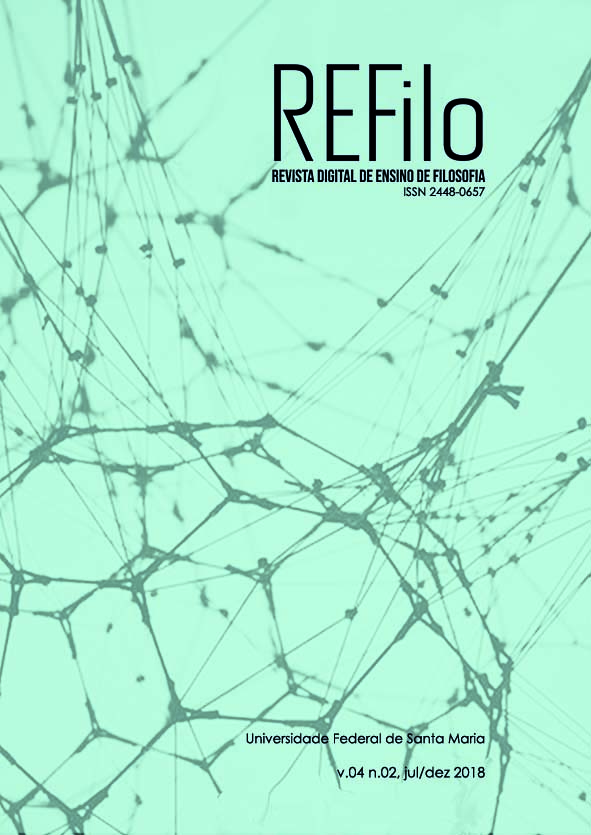Experience report: are we free or fated? Method and didactic sequence of a classroom prepared for a class of 9th year of elementary education
DOI:
https://doi.org/10.5902/2448065734588Keywords:
Destiny, Experience report, FreedomAbstract
This article presents a report of an experience carried out with a group of the final year of Elementary School in Brazil (9th grade). The methodology used to perform the intervention was based on the assumption that the cultural universe of the student must be acknowledged so that the planning can be elaborated accordingly, with a view to developing the students’ autonomy. Hence, from a questionnaire with that intention, the class plan “Freedom vs. Destiny” was elaborated. The didactic steps were a combination of the sequences approached by Kohan (1999) based on Lipman (1995) and Trombetta (2002; 2013), which include: sensibilization, problematization, philosophical investigation and systematization. All students, to some extent, referred to the discussion as one of their favorite part of the class. One student specified that by putting into debate ideas that differ from their own enabled them to think beyond. This has attracted a great deal of attention, as one of the main objectives of a Philosophy class is to broaden our viewpoints on problems, which is what we intend to do, not to create a consensus, but rather to encourage each one to reflect on different points of view.Downloads
References
ABBAGNANO, N. Dicionário de Filosofia. 4. ed. São Paulo: Cultrix, 2000.
BRUCE, M.; BARBONE, S. O problema do mal. In: BRUCE, M.; BARBONE, S. (Orgs.). Os 100 argumentos mais importantes da filosofia ocidental: uma introdução concisa sobre lógica, ética, metafísica, filosofia da religião, linguagem, epistemologia e muito mais. São Paulo: Cultrix, 2013. p. 54-55.
GALLO, S. A filosofia e seu ensino: conceito e transversalidade. In: SILVEIRA, R. J. T.; GOTO, R. Filosofia no Ensino Médio: temas, problemas e propostas. São Paulo: Edições Loyola, 2007. p. 15-36.
GALLO, S. Ensino de filosofia, uma pedagogia do conceito: os quatro passos didáticos. In: GALLO, S. Metodologia do ensino de filosofia: uma didática para o ensino médio. Campinas: Papirus, 2012. p. 94-98.
HOLBACH, B. de. System of nature. [S. l.: s. n.], 1770. Disponível em: <http://www.dominiopublico.gov.br/download/texto/gu008909.pdf> . Acesso em: 14 set. 2015.
KANT, I. Notícia do Prof. Immanuel Kant sobre a organização de suas preleções no Semestre de Inverno de 1765-1766. In:KANT, I. Lógica. Rio de Janeiro: Tempo brasileiro, 2011. p. 173-182.
KOHAN, W. O. Sugestões para implementar a filosofia com crianças em escolas. In: KOHAN, W. O.; WAKSMAN, V. (Orgs.). Filosofia para crianças na prática escolar. Petrópolis: Vozes, 1999. p. 85-112.
LIPMAN, M. O pensar na educação. Petrópolis: Vozes, 1995.
LIPMAN, M.; SHARP, A. M.; OSCANYAN, F. S. A filosofia na sala de aula. São Paulo: Nova Alexandria, 2001.
MONSTRO no final do livro. Sobrenatural. Direção: Mike Rohl. [S. l.]: Kripke Enterprises, Warner Bros. Television, Wonderland Sound and Vision. 2 abr. 2009.
PLATÃO. A república. 11. ed. Lisboa: Fundação Calouste Gulbenkian, 2008.
SÁNCHEZ VÁZQUEZ, A. Responsabilidade moral, determinismo e liberdade. In: SÁNCHEZ VÁZQUEZ, A. Ética. 30. ed. Rio de Janeiro: Civilização Brasileira, 2008. p. 107-132.
STERLING, G. A defesa do livre-arbítrio para o problema do mal. In: BRUCE, M.; BARBONE, S. (Orgs.). Os 100 argumentos mais importantes da filosofia ocidental: uma introdução concisa sobre lógica, ética, metafísica, filosofia da religião, linguagem, epistemologia e muito mais. São Paulo: Cultrix, 2013. p. 56-58.
TROMBETTA, G. L. O papel da operação reflexiva no ensino e no exercício da filosofia: contribuições para uma ideia de filosofia no ensino médio. In: FÁVERO, A. A.; RAUBER, J. J.; KOHAN, W. O. (Orgs.). Um olhar sobre o ensino de filosofia. Ijuí: Editora Unijuí, 2002. p. 235-247.
TROMBETTA, G. L. “Nos olhos”: Método e didática no ensino de filosofia. In: TROMBETTA, G. L.; BORTOLINI, B. de O.; KAPCZYNSKI, A. L. Filosofia nos olhos: experiências de ensino. Passo Fundo: Berthier, 2013. p. 7-15.








